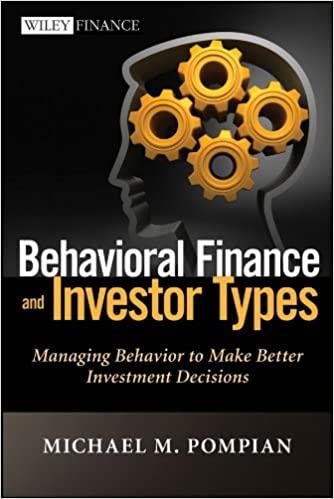Question
Suppose you are deciding whether to invest in Boston Beer IPO. The investment bankers will announce what value they are setting for the company to
Suppose you are deciding whether to invest in Boston Beer IPO. The investment bankers will announce what value they are setting for the company to start with, what percentage of the company they are selling, and how many shares will represent that portion of the company. To make a decision, you would have to decide the highest market capitalization at which you would be willing to invest. In other words, if you think the true value of the company is such that the shares are worth $X, you wouldn't want to invest if the bankers announce the sale at above $X. For these questions, I won't ask you to find X, but to think about what information you would need to find it.
There are two primary ways to value a company's stock before it is on the market. Choose one. Neither is necessarily better or worse, so you can choose either
- One is through "comparables." For this technique you would find public companies that you think are comparable and use their performance as a benchmark. You might figure out the ratio of the value of all of their outstanding stock to their accounting assets (market-to-book ratio) and interpret that as indicative of how much more investors feel like the company is worth than the sum of its parts. If you think a company is twice as good as the comparable, you might argue that they should have double the market-to-book ratio, and then figure out what you think the market capitalization should be by multiplying ratio by the company's assets, which you know before they go public.
- The other way is to start from the premise that a company's market cap should be the net present value of 20 years of free cash flow. You can then start from basic assumptions about price, cost, assumptions about growth, and other fundamentals of the business and build up from there.
1. Without knowing what happened later: Suppose you were going to use the 20 years of free cash flow method to come up with your personal value for Boston Beer. What information would you use to figure out how much your max price per share would be? (3-4 sentences)
Hints:
Remember that these questions are an opportunity to practice applying the tools you have learned in class.
Remember that in Strategy, your products price and cost are the outcomes of your decisions.
2. Now suppose that you were going to use the comparables method and Pete's and Red Hook are your best comparables to start with. Are there important ways in which Boston Beer is different from, or similar to Red Hook and Petes that would be important to your decision process? Do those facts make you think that Boston Beer should trade at a higher or lower market to book than Red Hook? Peets? (3-4 sentences)
The same hints from above apply
3. The tools from the class should have helped you decide what to do in this case. The lessons you learn should be applicable in other setting where the fundamental strategic forces are similar. What industries, in the last couple of years, are similar enough to how the craft beer industry was at the time of the case that you could use lessons from this case to make predictions about what would happen to those industries? What features of those industries make the lessons from the case applicable? (3-4 sentences)
Step by Step Solution
There are 3 Steps involved in it
Step: 1

Get Instant Access to Expert-Tailored Solutions
See step-by-step solutions with expert insights and AI powered tools for academic success
Step: 2

Step: 3

Ace Your Homework with AI
Get the answers you need in no time with our AI-driven, step-by-step assistance
Get Started


